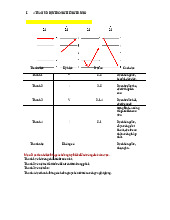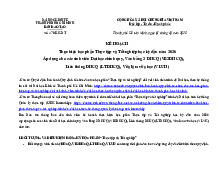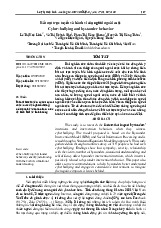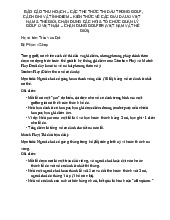



Preview text:
READING PASSAGE
IS CONSTANT USE OF ELECTRONIC MEDIA CHANGING OUR MINDS?
The power of modern electronic media – the net, Electronic media causes
mobile phones and video games – t o c apture the worries
attention of the human mind, particularly the young Power to V
mind, and then distract it, has lately become the subject of concern. Sb say S_V S, say sb, V: Reported
We are, say the worriers, losing the ability to apply speech
ourselves properly to a single task, like reading a book
in its entirely or mastering a piece of music on an 1. Some people believe that
instrument, with the result that our thinking is becoming modern electronic media shallower.
only have a negative effect on young people.
Nicholas Carr, the American science writer, has 2. Nicholas Carr’s book on
explored this theme for his new book, The Shallows, the subject is a bestseller.
in which he argues that new media are not just changing
our habits but our brain too. It turns out that the mature Sth is not A but B
human brain is not an immutable seat of personality Flow idea / Cha43n trướ7c 1
and intellect but a changeable thing, subject to ca8u
‘neuroplasticity’. When our activities alter, so does the
architecture of our brain, ‘I’m not thinking the way I 3. Nicholas Carr believes
used to think,’ writes Carr, I feel it most strongly when that electronic media
I’m reading.’ Years of internet use have, he suspects, have affected his
denied his ability to read deeply, to absorb himself in enjoyment of reading
books: ‘My brain wasn’t just drifting. It was hungry. It books.
was demanding to be fed the way the net fed it.’ He
describes gelling fidgety when faced with a long text: Alter (v) = change
‘When we go online, we enter an environment that
promotes cursory reading, hurried and distracted
thinking, and superficial learning.’
Carr cites research by Gary Small, a professor of 4. Gary Small’s research
psychiatry at UCLA, who concluded that constant supports Nicholas Carr’s
exposure to modern media strengthens new neural beliefs.
pathways while weakening older ones. Just five hours of
internet use is enough to awaken previously dormant
parts of the brain’s prefrontal cortex, concluded Small.
For Carr, this is proof that the net can rewire the
mind. He sees dangers. Deep thought, the ability to
immerse oneself in an area of study, to follow a
narrative, to understand an argument and develop a
critique, is giving way to skimming. Young users of the
Internet are good at drawing together information for a
school project, for example, but that does not mean they have digested it.
But is a changing mind a more stupid one? Jake Vigdor 7. looked at over
and Helen Ladd are researchers at Duke University, _______100,000 children__
North Carolina. In a study spanning five years and (type of information:
involving more than 100,000 children, they (number)+ đoMi tướ4ng
discovered a correlation between declining test research)
scores in both mathematics and reading and the spread
of home computers and broadband. ‘The decline In 8. found that lower
scores was in the order of one or two percent but it was _(n)_test scores_______and
statistically significant,’ says Vigdor, ‘The drop may not home computer use were
be that great but one can say that the increase in linked
computer use was certainly not positive.’ The cut-off
year for the study was 2005, when socialising was more Declining test scores ~ the
primitive. Since then, social networking sites have increase in home computer
become enormously powerful consumers of young use
people’s time. Vigdor and Ladd concluded that the
educational value of home computing was best The drop - not that great #
realised when youngsters were actively supervised the increase in computer by parents. use is not positive (+)
9. indicated that the
Only good when youngsters - be supervised by parents effects of greater home
computer use could not
10. concluded that _(n)__ ________should be involved in
be described as ___ _______ home computer use.
This tendency to skim is compounded by the
temptation of new media users to ‘multi-task’. Watch a
youngster on a computer and he could be Facebook-ing
while burning a CD or Tweeting on his mobile phone. 5. Management beliefs on
Modern management tends to promote multi- multi-tasking are proved
tasking as an expression of increased efficiency. correct by scientific
Science, on the other hand, does not. The human brain research.
is, II seems, not at all good at multitasking – unless it 6. David Meyer’s views on
involves a highly developed skill like driving. David the limitations of the
Meyer, a neuroscientist at the University of Michigan, brain have caused
says: ‘The bottom line is that you can’t simultaneously controversy.
be thinking about your tax return and reading an essay,
just as you can’t talk to yourself about two things at Controversy (n)
once. People may think otherwise but it’s a myth. With argument
complicated tasks, you will never, ever be able to
overcome the inherent limitations in the brain.’ Questions 1-6
Do the following statements agree with the information given in the reading passage?
Write TRUE if the statement agrees with the information
FALSE if the statement contradicts the information
NOT GIVEN if there is no information on this
1. Some people believe that modern electronic media only have a negative effect on young people.
2. Nicholas Carr’s book on the subject is a bestseller.
3. Nicholas Carr believes that electronic media have affected his enjoyment of reading books.
4. Gary Small’s research supports Nicholas Carr’s beliefs.
5. Management beliefs on multi-tasking are proved correct by scientific research.
6. David Meyer’s views on the limitations of the brain have caused controversy.
Question 7-10. Complete the notes below. Choose no more than two words
and/or a number from the passage for each answer
VIGDOR AND LADD’S RESEARCH
7. looked at over __________________ (type of information: (number)+ đoMi tướ4ng research)
8. found that lower _(n)________and home computer use were linked
9. indicated that the effects of greater home computer use could not be
described as __________
Describe sth as sth / adj
10. concluded that _(n)__________should be involved in home computer use Be involved in = take part in




